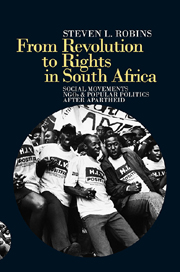 From Revolution to Rights in South Africa
From Revolution to Rights in South Africa Book contents
- Frontmatter
- Contents
- Foreword & Acknowledgements
- Abbreviations
- Zapiro cartoons
- 1 Introduction
- 2 Activist Mediations of ‘Rights’ & Indigeneous Identity
- 3 Citizens & ‘Bushmen’
- 4 ‘Civil Society’ & Popular Politics in the Postcolony
- 5 AIDS, Science & the Making of a Social Movement
- 6 Rights Passages from ‘Near Death’ to ‘New Life’
- 7 Sexual Rights & Sexual Cultures
- 8 Conclusion
- Bibliography
- Index
8 - Conclusion
Beyond Rights & the Limits of Liberalism
Published online by Cambridge University Press: 05 April 2013
- Frontmatter
- Contents
- Foreword & Acknowledgements
- Abbreviations
- Zapiro cartoons
- 1 Introduction
- 2 Activist Mediations of ‘Rights’ & Indigeneous Identity
- 3 Citizens & ‘Bushmen’
- 4 ‘Civil Society’ & Popular Politics in the Postcolony
- 5 AIDS, Science & the Making of a Social Movement
- 6 Rights Passages from ‘Near Death’ to ‘New Life’
- 7 Sexual Rights & Sexual Cultures
- 8 Conclusion
- Bibliography
- Index
Summary
The case studies in this book have drawn attention to the ambiguous and contradictory character of rights-based approaches to political mobilisation in post-apartheid South Africa. They question assumptions about the individualising and depoliticising nature of rights discourses (Brown 1995). The cases also draw attention to the diverse political rationalities and identities that NGOs and social movements encounter in their daily work. These include hybrid political discourses that defy the enduring binary categories of citizens and subjects, liberals and communitarians, modernists and traditionalists and so on. The NGO and social movement activists discussed in this book appear to have recognised the profoundly hybrid, provisional and situational character of politics in post-apartheid South Africa. The following account of politics in Crossroads, an informal settlement in Cape Town, draws attention to these highly mobile political practices.
In June 1986, during the height of the revolutionary struggle against apartheid, I witnessed the South African Defence Force (SADF) arming Xhosa-speaking vigilantes in a bloody battle against anti-apartheid activists in Crossroads, a shantytown settlement on the outskirts of Cape Town. At the time, I was working with a television crew determined to obtain incriminating footage of security force complicity in fuelling intra-community violence in Crossroads. The SADF and South African Police had clandestinely armed a large group of Xhosa-speaking vigilante elders, referred to in the media either as the witdoeke or ‘fathers’, in an attempt to violently purge Crossroads of militant ANC youth and women's activist organisations that had established strongholds in the informal settlement in the early 1980s.
- Type
- Chapter
- Information
- From Revolution to Rights in South AfricaSocial Movements, NGOs and Popular Politics After Apartheid, pp. 165 - 174Publisher: Boydell & BrewerPrint publication year: 2008


